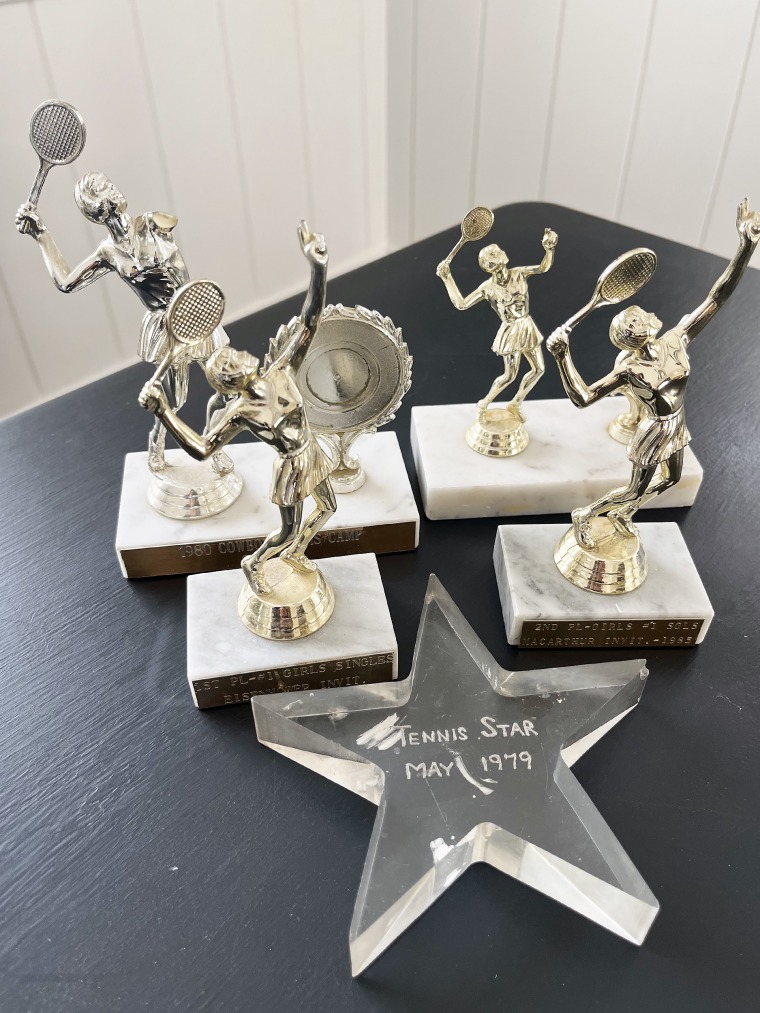Chris Pratt is throwing shade at all those adults holding on to mementos of their childhood glory days, and his main target is wife Katherine Schwarzenegger Pratt.
In an Instagram post, Pratt features a smiling Schwarzenegger holding a star-topped trophy with the inscription “Problem Solving Super Star, 4th grade, 2000.” Pratt calls his mother-in-law Maria Shriver “thoughtful” for saving all of her children’s special childhood items for years.
“To see my darling wife beaming with sentiment as she opens these crates of meticulously organized keepsakes, remembering her cherished youth, makes me grateful for the efforts her folks put into archiving,” Pratt writes. “I cannot say how proud I am of my wife for being a fourth grade problem solving superstar.”
But Pratt can’t help his sarcasm. “There’s also a trophy for 'most improved two year old' in swim class. Wow!! Sorry to the other two-year-olds. You didn’t cut it. Move on. What’s that you say? She was the only two-year-old in swim class? I’m proud nonetheless.”
Pratt goes on to ask questions a lot of parents may wonder: Are childhood trophies “okay to toss? … Can they be donated? Repurposed? How many do we gotta keep? Not all of them, right? Any of them?”
As someone who grew up playing a sport — tennis — for my entire youth, I feel qualified to respond to Pratt. Because … I am THAT PERSON who, in my mid-50s, still has many of my trophies. When my dear mother packed up our childhood home decades ago, she says she could not bear to toss the trophies that my brother and I had collected through years of tournaments.
Though the trophies ranged in height and achievement (from third place at my first-ever tournament at age 9 in 1977 to more accomplished titles as I got older), my mother had them all minimized to just the tennis player figurine and the trophy base, so they all fit in a box: one for my brother, and one for me. I got that box in my mid-20s and have carried it with me through numerous moves through four different states. (And yes, every time, my husband asks, “Do we really need to take your trophies with us?”)

Some may call it vanity. I call it simply … nostalgia, because those trophies reflect such an important era in my life. The hours and sacrifices we all put into the sport are something of a family legacy, one that we still reflect on and cherish decades later. Is it too much to have a box of metal figurines to remind me of that?
My box sits in my basement, but a few of the trophies are out on display in my home. It turns out, they make great jewelry holders! I have one in my bathroom that holds my rings every night. When my brother had a 50th birthday party, it was tennis-themed and his little trophies were on all the tables.
Organizing expert Rachel Rosenthal, founder of Rachel and Company, a Washington, DC-based professional organizing firm, says she encounters this issue frequently.
“This is something that people really deal with,” Rosenthal tells TODAY.com. “People honestly don’t know what to do with them so they keep them and keep shifting them with each move or downsize within the family.”
Rosenthal has some strategies on what to do with old boxes of treasured childhood memories, but she first recommends asking yourself a key question: “Why am I keeping the trophy?”
Condense and contain
“If you were given a huge box of them from childhood, I would review them and find a storage container that is smaller and more manageable (and know where you will store this in your house) and just keep the ones you truly have a sentimental attachment to,” Rosenthal says. She adds that since parents are the ones keeping the trophies, they may not know which trophies matter most to their children.
No rule on how many to keep
Rosenthal says “there’s no rule” on how many trophies to keep. She works with a lot of clients who decide to not keep any of them.
“Many times, clients don’t need the physical item to connect to the time of winning the trophy or emotions behind it,” Rosenthal says. “And some clients love to see their accomplishments as a child so we try and display a smaller collection or be creative with how we are keeping them.”
Get crafty
Rosenthal says that with a little DIY and creativity, you can turn trophies into different things. For example, use the tops and turn them into wine bottle toppers (add the stopper with glue) or a coat rack. Or, use them as bookends, a doorstop or a paperweight.
Another option: Take a photo of all the trophies and create a meaningful book, along with written memories. "The book could be displayed, vs. your trophies sitting in a large box being stored in the basement for years, not being looked at ... ever," Rosenthal says.
Recycle or donate
If you want to recycle trophies, try the Nationwide Trophy Recycling Program, a Wisconsin-based nonprofit that recycles them by rebuilding the parts into new trophies, which are then donated. Some donation centers, such as Goodwill and Salvation Army, also accept old trophies.
As for my own two kids, now 24 and 21, I have “curated” a collection of their childhood sports achievements — from medals to trophies. (I even saved every one of their team jerseys, which I plan to turn into a quilt.) My end goal: They will have a box of memories to take with them into their adult lives. Will they keep or discard it? That’s up to them.
